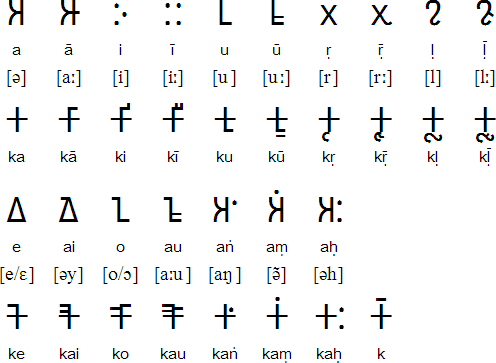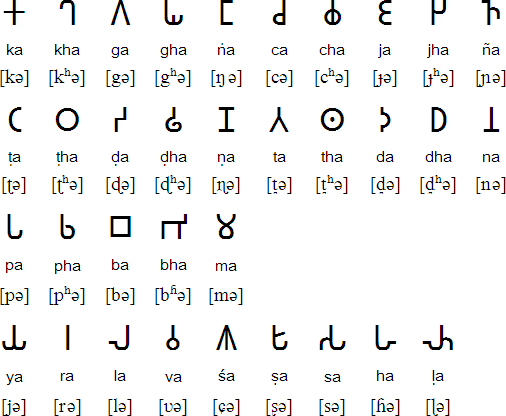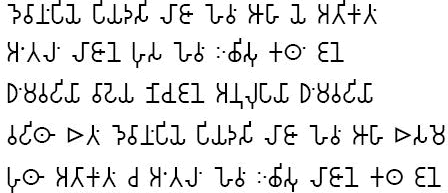The earliest known inscriptions in the Brāhmī alphabet are those of King Asoka (c.270-232 BC), third monarch of the Mauryan dynasty.
Brāhmī was used to write a variety of languages, including Sanskrit and Prakrit.
Notable features
- Type of writing system: abugida - each letter represents a consonant with an inherent vowel. Other vowels were indicated using a variety of diacritics and separate letters.
- Letters are grouped according to the way they are pronounced.
- Many letters have more than one form.
- Direction of writing: left to right in horizontal lines
Vowels and vowel diacritics

Consonants

Sample text

Asokan Edict - Delhi Inscription
Transliteration
devānaṁpiye piyadasi lājā hevaṁ āhā ye atikaṁtaṁaṁtalaṁ lājāne husa hevaṁ ichisu kathaṁ jane
dhaṁmavaḍhiyā vāḍheya nocujane anulupāyā dhaṁmavaḍhiyā
vaḍhithā etaṁ devānaṁpiye piyadasi lājā hevaṁ āhā esame
huthā atākaṁtaṁ ca aṁtalaṁ hevaṁ ichisu lājāne katha jane
Translation
Thus spoke king Devanampiya Piyadasi: "Kings of the olden time have gone to heaven under these very desires. How then among mankind may religion (or growth in grace) be increased? Yea, through the conversion of the humbly-born shall religion increase"Source: http://www.virtualvinodh.com/brahmi-lipitva/144-asokan-edict-delhi
Some modern descendants of Brāhmī
Bengali, Devanāgarī, Gujarāti, Gurmukhi, Kannada, Khmer, Malayalam, Oriya, Sinhala, Tamil, Telugu, TibetanLinks
Information about Brāhmīhttp://en.wikipedia.org/wiki/Br%C4%81hm%C4%AB_script
http://www.virtualvinodh.com/brahmi-lipitva
http://www.ancientscripts.com/brahmi.html
http://www.nibbanam.com/Brahmi/brahmi.htm
Brāhmī fonts
https://sites.google.com/site/brahmiscript/
The Edicts of King Asoka
http://www.cs.colostate.edu/~malaiya/ashoka.html









.jpg)
.jpg)

.jpg)





0 comments:
Post a Comment
Note: Only a member of this blog may post a comment.